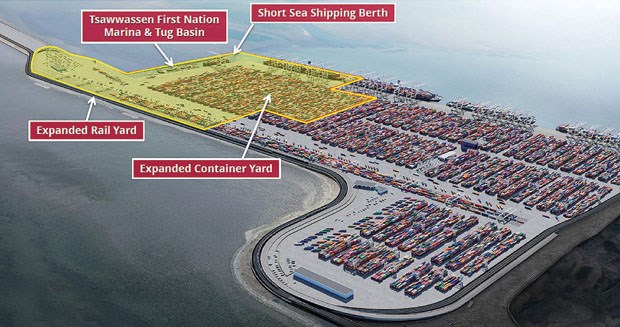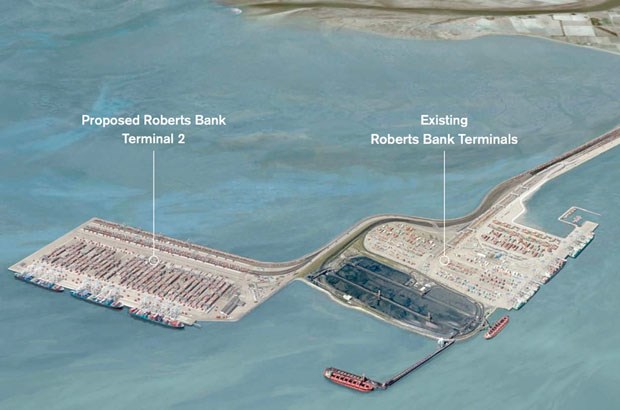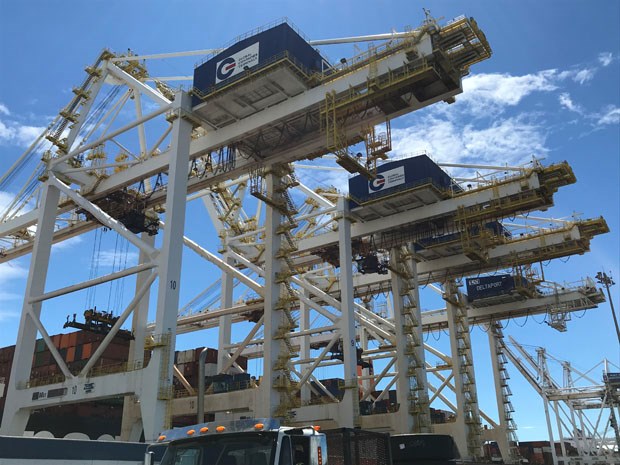The feud between the operator of the container terminal at Roberts Bank and its landlord, the Vancouver Fraser Port Authority, continues to intensify.
And it’s all about the port authority’s plan for a major expansion.
The port authority wants to build a second three-berth container terminal on a man-made island adjacent to the current facility, a controversial project called Terminal 2 (T2).
Global Container Terminals, which runs the Deltaport container terminal but wasn’t considered to operate T2, has instead been pitching an expansion idea of its own, a project being called Deltaport Fourth Berth (DP4).
The port’s application went through a public hearing last year and is now being considered by an independent review panel, which is to make a recommendation to the federal government.

It’s been a war of words between the two sides as GCT, which has been lobbying publicly against the port’s proposal, recently went so far as to tell the review panel the port “knowingly made false or misleading statements before the closing of the public record” with regards to claims that there are considerable risks with DP4 as it relates to fish habitat.
“The new information is that the VFPA now admits, after the public record is closed, that locating the project adjacent to the existing Deltaport may be technically feasible,” a recent letter to the review panel stated. “It follows that every statement of the VFPA asserting that such an option is not technically feasible is a false statement.”
The letter also states that the port authority’s “false assertion that Deltaport’s expansion was not technically feasible” is misleading to the review panel and other public hearing participants, including the City of Delta and the Tsawwassen First Nation, which expressed a desire that other options be considered.
The port authority has said it would not comment on the GCT letter to the panel, adding it would be for the panel to address as it deems appropriate.
However, a statement by Duncan Wilson, vice-president of environment, community and government affairs for the port authority, noted, “We are confident there has been a full and robust hearing process. Much information was exchanged and competing views expressed through the panel process – including the views of GCT – and we are now awaiting the panel’s report. It remains our view that Roberts Bank Terminal 2 would provide competitive marine terminal capacity to meet increased container trade demand, while minimizing environmental effects.”
Global Container Terminals has also been saying T2 is outmoded and no longer viable due to changes in a number of market factors.
“It is GCT’s view that the long-term sustainability of our gateway is only achievable through careful terminal design that reflects a modern, innovative and a more sustainable approach to planning and constructing such an expansion,” the submission by GCT states.
The company outlined several areas of concern regarding the T2 rationale, assessment and the port’s environmental impact statement.
GCT notes it’s important to consider that approximately 35 per cent of all inbound containers entering Canada’s West Coast ports are “discretionary” cargo, destined for the United States by rail. It means that importers and shipping lines can, at their discretion, redirect through other ports in Canada or U.S.
The company also says “there is material risk associated with discretionary cargo, and thus private capital is better suited than public funds to assume this risk in order to justify major terminal capacity projects.”
According to the port authority, expanding the existing Deltaport terminal is not an option for several reasons, one being Fisheries and Oceans Canada having prohibited further land reclamation inland from Deltaport.
Also, expanding Deltaport would mean only one terminal operator, GCT, would control a significant majority of the market for container terminal services.

“Healthy competition is necessary to ensure users continue to pay reasonable rates to pay for reliable service,” the port states.
Saying the Port of Vancouver’s vision is to be the world’s most sustainable port, the authority’s Cliff Stewart and Tom Corsie made a presentation to Delta council last year explaining the rationale behind T2, noting their most recent assessment determined the number of ships coming to the port would see little change but the amount of cargo, due to larger ships, would increase.
“Capacity shortfalls would likely create negative impacts on port users and local communities as a result of terminal congestion, including increased truck and train backups, vessel scheduling challenges, cargo redirection, increased truck traffic to and from the United States, increased transportation costs for Canadian goods, and the loss of business for importers and exporters,” the port’s submission explains.
Wilson last year countered the argument that DP4 and expanding capacity at existing port facilities, including Prince Rupert, would meet container traffic needs, saying expansion elsewhere would still leave West Coast capacity constrained.



